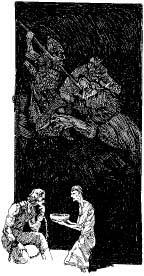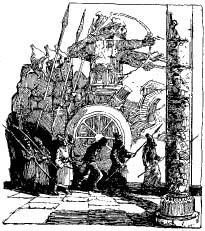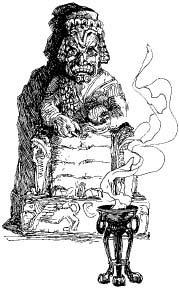The Savage Tales of Solomon Kane (54 page)
Read The Savage Tales of Solomon Kane Online
Authors: Robert E. Howard,Gary Gianni

Kane looked out the window, which was larger than the other had been, and not so thickly barred. He was looking out over the city from a considerable height. He looked down on narrow streets, broad avenues flanked by what seemed to be columns and carven stone lions, and on wide expanses of flat-roofed houses, on many of which canopies seemed to argue that people basked under their shade. Much of the buildings seemed to be of stone, much of sun-dried bricks. There was a massiveness about their architecture that was vaguely repellent – a sombre heavy motif that seemed to suggest a sullen and slightly inhuman character of the builders.

He saw that the wall which surrounded the city was tall, thick and upheld towers spaced at regular intervals. He saw armored figures moving sentinel-like along the wall, and meditated upon the war-like aspect of this people. The streets and market-places below him offered a colorful maze as the richly clad people moved in an ever-shifting panorama.
As for the building which was his prison, Kane naturally could make out but little of its nature. Yet below him he saw a series of massive tiers descending like giant stair-steps. It must be, he decided, with a rather unpleasant sensation, built much like the fabled Tower of Babel, one tier above another.
He turned his attention back to his chamber. The walls were rich in mural decorations, carvings painted in various colors, well-tinted and blended. Indeed the art was of as high standard as any Kane had ever seen in Asia or Europe. Most of the scenes were of war or the hunt – powerful men with black beards, often curled, in armor, slaying lions and driving other warriors before them. Some of these other warriors were naked black men, others somewhat like their conquerors. The human figures were not as well depicted as those of the beasts, seemingly conventionalized to a point that often lent them a somewhat wooden aspect. But the lions were portrayed with vivid realism. Some of the scenes showed the black-bearded slayers in chariots, drawn by fire-breathing steeds, and Kane felt again that strange sense of familiarity, as if he had seen these scenes, or similar scenes, before. These chariots and horses, he noted, were inferior in life-likeness to the lions; the fault was not in conventionalizing but in the artist's ignorance of his subject, Kane decided, noting mistakes that seemed extremely incongruous, considering the skill with which they were portrayed.
Time passed swiftly as he pored over the carvings, and presently the silent black man entered with food and wine.
As he set down the viands, Kane spoke to him in a dialect of the bush-tribes, to one of the divisions of which he believed the man belonged, noting the tribal scars on his features. The dull face lighted slightly and the man answered in a tongue similar enough for Kane to understand him.

“What city is this?”
“Ninn, bwana.”
“Who are these people?”
The dull black shook his head in doubt.
“They be very old people, bwana. They have dwelt here very long time.”
“Was that their king who came to my chamber with his men?”
“Yes, bwana, that be King Asshur-ras-arab.”
“And the man with the lash?”
“Yamen, the priest, bwana Persian.”
“Why do you call me that?” asked Kane, nonplussed.
“So the masters name you, bwana –” The black shrank back and his black skin turned ashy as the shadow of a tall figure fell across the doorway. The shaven-headed half-naked giant Shem entered and the black man fell to his knees, wailing his terror. Shem's mighty fingers closed about the black throat and Kane saw the wretched black's eyes protruding, his tongue thrust from his gaping mouth. His body writhed and threshed unavailingly, his hands clawed weakly and more weakly at the iron wrists. Then he went limp in his slayer's hands and as Shem released him, his corpse slumped loosely to the floor. Shem smote his hands together and a pair of giant blacks entered. Their faces turned ashy at the sight of their companion's corpse, but at a gesture from Shem, they callously laid hold of the dead man's feet and dragged him forth.
Shem turned at the door and his opaque implacable eyes met Kane's gaze, as if in warning. Hate drummed in Kane's temples, and it was the grim eyes of the murderer which fell before the cold fury in the Englishman's glare. Shem went noiselessly forth, leaving Kane to his meditations.
When food was next brought to Kane, it was brought by a rangy young black of genial and intelligent appearance. Kane made no effort to speak to him; apparently the masters did not wish for their slave to learn anything about them, for some reason or another.
How many days Kane remained in the high-flung chamber, he did not know; each day was exactly like the last and he lost count of time. Sometimes Yamen the priest came and looked upon him with a satisfied air that made Kane's eyes turn red with the killer's lust; sometimes Shem noiselessly appeared and as noiselessly disappeared. Kane's eyes were riveted to the key that swung from the silent giant's girdle. Could he but once get within reach of the fellow – but Shem was careful to stay out of his reach unless Kane was surrounded by warriors with ready javelins.

Then one night to his chamber came Yamen the priest with Shem and some fifty acolytes and soldiers. Shem unlocked Kane's chains from the wall, and between two columns of soldiers and priests the Englishman was escorted along the winding galleries, lighted by flaring torches set in the niches along the walls, and borne in the hands of the priests.
By the light Kane observed again the carven figures marching everlastingly around the massive walls of the galleries. Many were life-size, some dimmed and somewhat defaced as with age. Most of these, Kane noted, portrayed men in chariots drawn by horses, and he decided that the later, imperfect figures of steeds and chariots had been copied from these older carvings. Apparently there were no horses or chariots in the city now. Various racial distinctions were evident in the human figures – the hooked noses and curled black beards of the dominant race were plainly distinguished. Their opponents were sometimes black men, sometimes men somewhat like themselves, and occasionally tall rangy men with unmistakable Arab features. Kane was startled to note, too, that in some of the older scenes, men were depicted whose apparel and features were entirely different from those of their enemies. They always appeared in battle with the other race, and not always in retreat as in the case of the others. These frequently seemed to be having the best of the fight, and it was significant, Kane thought, that nowhere were these men portrayed as slaves. But what interested him was the familiarity about their features. No vague misplaced feeling about that familiarity! Those carven features were like the countenance of a friend in a strange land to the wanderer. But for their strange, barbaric arms and apparel they might have been Englishmen, with their Aryan features and yellow locks. They rode horses and rode like the wind.
Somewhere, in the long, long ago, Kane knew, the ancestors of the men of Ninn had warred with men kin to his own ancestors – but in what age and what land, he could not know. Certainly the scenes were not laid in the country that was now the home-land of the Ninnites, for these scenes showed wide fertile plains, grassy hills and wide rivers that wound through fertile plains. Aye, and great cities, like Ninn, but strangely unlike. And suddenly Kane remembered where he had seen similar carvings, wherein kings with black curled beards slew lions from chariots – on crumbling pieces of masonry that marked the site of a long forgotten city in Mesopotamia he had seen them, and men had told him those ruins were all that remained of Nineveh the Bloody, the accursed of God.
Now the Englishman and his captors had reached the ground-tier of the great temple, and they passed between huge squat columns, carven as were the walls, until they came to a vast circular space between the massive wall and the flanking pillars. Apparently cut from the stone of the mighty wall sat a colossal idol, whose carven features were as devoid of human weakness and kindness as the face of a Stone Age monster.
Facing the idol, on a stone throne in the shadow of the pillars, sat the King Asshur-ras-arab, the firelight flickering on his strongly chiseled face so that at first Kane thought that it was an idol that sat on that throne.
Before the god, facing the king's throne, there was another, smaller throne, before which stood a brazier on a golden tripod; coals glowed in the brazier and smoke curled languorously upward.

A flowing robe of shimmering green silk was put upon Kane, hiding his tattered, worn and stained garments and the golden chains. He was motioned to sit in the throne before the brazier, and he did so. Then his ankles and wrists were locked cunningly to the throne, hidden by the folds of the silken robe. Then the lesser priests and the soldiers melted away, leaving only Kane, the priest Yamen, and the king upon his throne. Back in the shadows among the tree-like columns Kane occasionally glimpsed a glint of metal, like fire-flies in the dark. The soldiers still lurked there, out of sight. He sensed that some sort of a stage had been set; somehow he got a suggestion of charlatanry in the whole procedure.
Now Asshur-ras-arab lifted the golden wand and struck once upon a gong that hung near his throne, and a full mellow note like a distant chime echoed among the dim reaches of the shadowy temple. Along the dusky avenue between the columns came a group of men whom Kane realized must be the nobles of that fantastic city. They were tall men, black-bearded and haughty of bearing, clad in shimmering silk and gleaming gold. And among them walked one in golden chains, a youth whose attitude seemed a mixture of apprehension and defiance.
All knelt before the king, bowing their heads to the floor, and at a word from him, rose and faced the god and the Englishman before the god. Now Yamen, with the firelight glinting on his shaven head and evil eyes, so that he looked like a paunchy demon, cried out a sort of weird chant and flung a handful of powder into the brazier. Instantly a greenish smoke billowed upward, half-veiling Kane's face. The Englishman gagged; the smell and taste were unpleasant in the extreme. He felt groggy, drugged. His brain reeled like a drunken man's and he tore savagely at his chains. Only half conscious of what he said, unaccustomed oaths ripped from his lips.